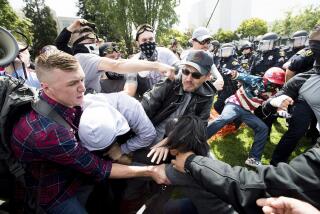Justices Weigh Standards for Disqualifying Judges From Cases
- Share via
WASHINGTON — A lawyer for three men arrested in a 1990 protest at Ft. Benning, Ga., asked the Supreme Court on Wednesday to broaden the standard used to disqualify judges whose impartiality has been questioned.
Peter J. Thompson, attorney for the three protesters, said a judge’s courtroom conduct should be considered when determining if there are reasonable grounds to remove the judge from a case for bias.
But Assistant Solicitor General Thomas G. Hungar said the courts for 80 years have relied almost exclusively on behavior outside the courtroom when deciding if a judge accused of bias should disqualify himself.
Hungar said common sense dictates that courtroom actions should not be weighed in disqualification decisions because virtually every judicial ruling will be seen as unfair by some of the parties in the litigation.
The debate stemmed from U.S. District Judge J. Robert Elliott’s refusal to disqualify himself from the 1991 trial of the three men, the Rev. Roy Bourgeois of Lutcher, La., John Patrick Liteky of Baltimore, and his brother, Charles Liteky of Washington.
The three were convicted of splashing blood inside the Army School of Americas in November, 1990, to protest the involvement of Latin American soldiers who graduated from the school in the 1989 slayings of six Jesuit priests and two women in El Salvador.
The three had asked Elliott to disqualify himself because he had presided over a 1983 trial involving Bourgeois. They argued that the judge’s conduct during the earlier proceeding would lead a reasonable person to conclude that he was biased against Bourgeois.
Elliott refused to step down. The U.S. 11th Circuit Court of Appeals agreed, although other circuit courts have held that courtroom behavior can be considered in determining if a judge should be removed from a case for bias.
In questioning the two lawyers Wednesday, several justices seemed to agree with that approach.
More to Read
Get the L.A. Times Politics newsletter
Deeply reported insights into legislation, politics and policy from Sacramento, Washington and beyond. In your inbox twice per week.
You may occasionally receive promotional content from the Los Angeles Times.










